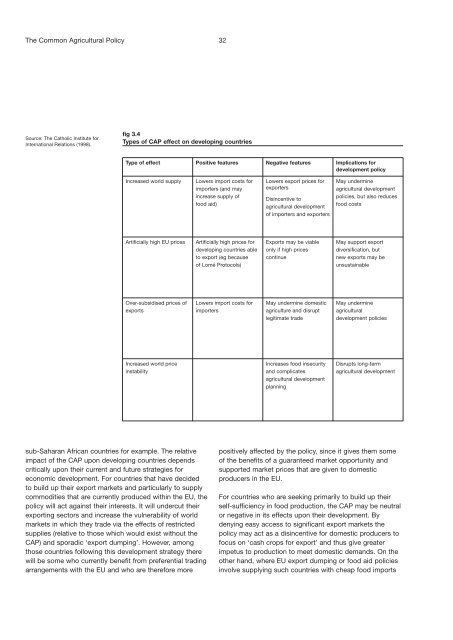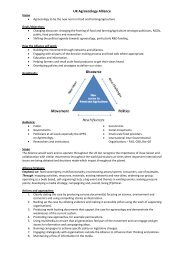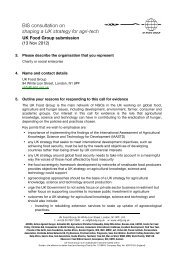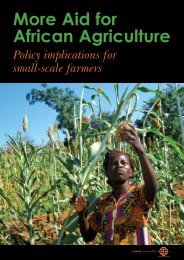Common Agricultural Policy - UK Food Group
Common Agricultural Policy - UK Food Group
Common Agricultural Policy - UK Food Group
Create successful ePaper yourself
Turn your PDF publications into a flip-book with our unique Google optimized e-Paper software.
The <strong>Common</strong> <strong>Agricultural</strong> <strong>Policy</strong> 32<br />
Source: The Catholic Institute for<br />
International Relations (1998).<br />
fig 3.4<br />
Types of CAP effect on developing countries<br />
Type of effect<br />
Positive features Negative features Implications for<br />
development policy<br />
Increased world supply<br />
Lowers import costs for<br />
importers (and may<br />
increase supply of<br />
food aid)<br />
Lowers export prices for<br />
exporters<br />
Disincentive to<br />
agricultural development<br />
of importers and exporters<br />
May undermine<br />
agricultural development<br />
policies, but also reduces<br />
food costs<br />
Artificially high EU prices<br />
Artificially high prices for<br />
developing countries able<br />
to export (eg because<br />
of Lomé Protocols)<br />
Exports may be viable<br />
only if high prices<br />
continue<br />
May support export<br />
diversification, but<br />
new exports may be<br />
unsustainable<br />
Over-subsidised prices of<br />
exports<br />
Lowers import costs for<br />
importers<br />
May undermine domestic<br />
agriculture and disrupt<br />
legitimate trade<br />
May undermine<br />
agricultural<br />
development policies<br />
Increased world price<br />
instability<br />
Increases food insecurity<br />
and complicates<br />
agricultural development<br />
planning<br />
Disrupts long-term<br />
agricultural development<br />
sub-Saharan African countries for example. The relative<br />
impact of the CAP upon developing countries depends<br />
critically upon their current and future strategies for<br />
economic development. For countries that have decided<br />
to build up their export markets and particularly to supply<br />
commodities that are currently produced within the EU, the<br />
policy will act against their interests. It will undercut their<br />
exporting sectors and increase the vulnerability of world<br />
markets in which they trade via the effects of restricted<br />
supplies (relative to those which would exist without the<br />
CAP) and sporadic ‘export dumping’. However, among<br />
those countries following this development strategy there<br />
will be some who currently benefit from preferential trading<br />
arrangements with the EU and who are therefore more<br />
positively affected by the policy, since it gives them some<br />
of the benefits of a guaranteed market opportunity and<br />
supported market prices that are given to domestic<br />
producers in the EU.<br />
For countries who are seeking primarily to build up their<br />
self-sufficiency in food production, the CAP may be neutral<br />
or negative in its effects upon their development. By<br />
denying easy access to significant export markets the<br />
policy may act as a disincentive for domestic producers to<br />
focus on ‘cash crops for export’ and thus give greater<br />
impetus to production to meet domestic demands. On the<br />
other hand, where EU export dumping or food aid policies<br />
involve supplying such countries with cheap food imports





